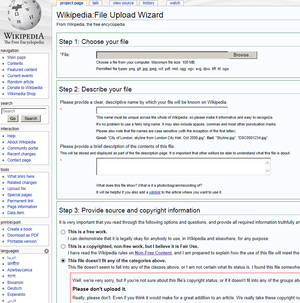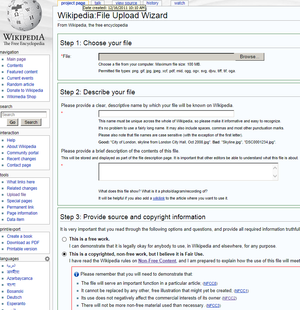Internal talk:Public Policy/Orphan works
Jump to navigation
Jump to search
Outline
Organizing constraints: Speaker has little time -- 5 minutes? 10? and audience does not know Wikimedia. Because there are many speakers, the orphan issue itself is likely to be explained clearly and we do not have to do that in detail
Background
- What are orphan works?
- What copyright-related materials do we store in English Wikipedia and Commons? (Explain Commons)
- How Wikimedia projects have benefited from public domain works: media in Commons, text in Wikisource and Wikipedia, etc..
Legislative details
- What do we want in proposed legislation? (likely answer: a feasible, mechanized procedure that Wikimedians can systematically follow that gets us to a "safe harbor" for the orphan/ambiguous cases -- and if a copyright owner shows up we understand the orphan rules don't apply any more and we need permission)
- We might want to illustrate proposed solutions in very practical terms, e.g. with screen shots, to communicate how we'd use it. Communicate that we address this class of issues frequently, and that hundreds of people do so.
- What do we think of the proposed solutions, e.g. in the Copyright Office's 2006 report? Would some be too burdensome for use on Wikimedia projects? (possible answer: they're good, but in addition we'd like to avoid marking up the content being used with an "orphan" stamp, and put that info in the metadata instead if we can)
- How are Wikimedia's needs different than the more well-known case of Google Books etc.
Comments from Slowking4
- Slowking4 says we want a procedure that we can say we followed in the metadata of an uploaded file. We'll put it in the licensing terms e.g. on commons. It gives a "safe harbor" - a defense for the good faith. we could also have a licensing procedure going forward. they could migrate it to flicker, after it had been digitized by Wikimedians. The copyright holder would benefit from it. (just pennies normally). it cuts through the uncertainty. if we agree to the procedure we can keep these cases out of court. This way nobody needs to threaten that. We are already doing well at crediting the source of photos."
- "We're in favor of any reform." We do not need to take a specific stance on specific legislation here. Our principles are clear and simple.
- We can mention in our briefings in April, and suggested congressional briefings prep on April 12, and briefings themselves on April 14. Could include students.
Points we'd want to make
- we want to avoid anyone having to pay an self-defense fee in escrow. that's an undue burden
- we want to avoid other undue burdens'
- we want the procedure to be simple
- we like the idea that not-for-profit uses have a low low cap or zero on how much they owe for infringement. there is a list of institutions that are eligible for a zero-fee. That includes museums and archives. We would like Wikimedia foundation projects to be on that list
- low-res thumbnail-size pix? as an icon. or for identifying a person or subject? JS says this is a fair-use situation now. Maybe not relevant to orphan works
- Commons's rule is that the material must be in the public domain in the U.S. and in the country-of-origin
- Straightforward rules written at the eighth grade reading level are necessary if you are serious about satisfactory compliance from high school students and people who speak English as a second language. Complicated and difficult rules are unlikely to result in satisfactory compliance by high school students and second language speakers. The Internet makes it possible for people of all ages and language abilities to interact with digital works, and our rules on copyright need to be usable by the full spectrum of Internet users.
- Wikimedia is systematically careful about copyright
Definitions
Source for most of these: 2006 copyright office Report on Orphan Works
- orphan works -- These are works whose copyright owners cannot be identified or cannot be located, and therefore permission cannot be obtained from them for using the works. (The 2006 report, page 35, excludes works for which it is not known whether a copyright currently applies, e.g. because creation date or location or creator are unknown. That report refers to such situations as "problems determining copyright status. Wikimedia DC would definitely prefer that the legislation includes such cases, which are just like orphans in our practice. See our Oak Ridge example for a case like that. However, for clarity of communication, note that the Copyright Office report did not call those orphan works.)
- registry -- In this context, this refers to databases where works and their copyright ownership are listed and searchable. There are many registries of copyrighted works whose copyright-owner is known; there are, or could be, registries of orphan works which identify someone who identify those works as orphans, describe the search they conducted to find an owner, and how the orphan-work was used.
- 1976 Copyright Act -- This U.S. law says a copyright applies as soon as a work is "fixed in a tangible medium of expression." It removed the requirement of the 1909 Act that a work be registered with the Copyright Office. The 1976 law was more compatible with the international Berne Convention. (These statements are simplifications of a more complex legal situation.)
- Berne Convention -- This treaty on copyrights forbids national laws from imposing the requirement that creators of works would have to register them explicitly, or renew them, or give certain kinds of notice to users. Apparently, it says copyrights must apply mostly automatically. (There had been a lot of complaints that it was hard to track and keep up the copyrights by freelance essayists, for example.) It is implied that the U.S. didn't sign on to this convention, or not early anyway.
- diligent search -- a likely requirement of a law permitting the use of orphan works is that the user has tried to search for the copyright owner, and the law introduces less friction to the extent if makes a clear explicit feasible to-do list for that user to satisfy the search requirement. So one "diligent search" requirement might be that the user has conducted certain queries to specific registries to see if the works were listed there. A search can be more or less deep or diligent (it's both a quantitative and qualitative spectrum), so people say sometimes refer to a "reasonably diligent search" when referring to that threshold that is sufficient for a user to use the orphan work.
- no response case -- Suppose a copyright owner is identified but does not respond to requests by potential users of the work? The Copyright Office report recommends against calling this an "orphan works" case, because the copyright owner is not obliged to respond. However this is in the class of marginal cases that commentators of the orphan-works cases sometimes mention or make recommendations about.
- protection and protected -- In the 2006 Copyright Office report a work is said to be protected if it is copyrighted, and its owner is thus protected from expropriation. I (Peter) recommend we avoid this term, because it's ambiguous: Wikimedians often think about whether a user or use of a work is protected from claims/accusations/prosecution for copyright infringement. Indeed the purpose of an orphan works rule would be to "protect" users and uses -- but this is the wrong use of the word to a copyright expert. It is better for broad communication to say that we want a "safe harbor" for users and uses. (The term comes from User:Slowking4 and may need a brief definition in our documents if the copyright people do not recognize it.) If asked about "protection," think thrice before answering; it's trappy.
- safe harbor: a legal state, the desired destination of a user of an orphan work, who can demonstrate having followed appropriate procedures to limit risks of prosecution and payment of damages. An orphan works law would create this space.
- Collecting societies or Reproduction Rights Organizations act as agents for a large number of copyright owners. Collecting societies administer copyrights, and collect and distribute income, in relation to copyrights owned by their members. (Source: Society of American Archivists paper below.) These are talked about a lot in the copyright and orphan works realms, especially internationally. They don't seem relevant to Wikimedia cases.
- "Formalities" -- The Berne Convention requires that the countries do not impose a filing or registration requirement on creators of works to get them copyright; basically it must be easy or automatically. The US got on board with this in 1988 more or less. (2006, page 60)
- The TRIPS Agreement is part of the WTO agreement and explicitly bans formalities to get a copyright on a created work. (2006, page 60)
Peter's to-do's
- ask review from User:MoonRiddenGirl, Luis Villa, Stephen LaPorte, Sumana, w:User:Levendowski, and/or others.
- ask Kristin whether "fair use" in US also applies to native american tribes and languages
- review my notes from sources, and grab for writeup
- after May 14, blog post about this.
Guidance for written statement
- The draft below is organized, as requested by the Copyright office, along the lines of the topics addressed by the panels, per the original inquiry. Please consult with User:Antony-22 before reorganizing sections.
- They asked us to respond to what others said in our written statement, not just reiterate our spoken comments at the panel.
- Should probably aim for about 5 pages
- Want to get this done in advance of WMDC board meeting on March 29
- Comments/differences on matters of substance before then are especially of interest.

